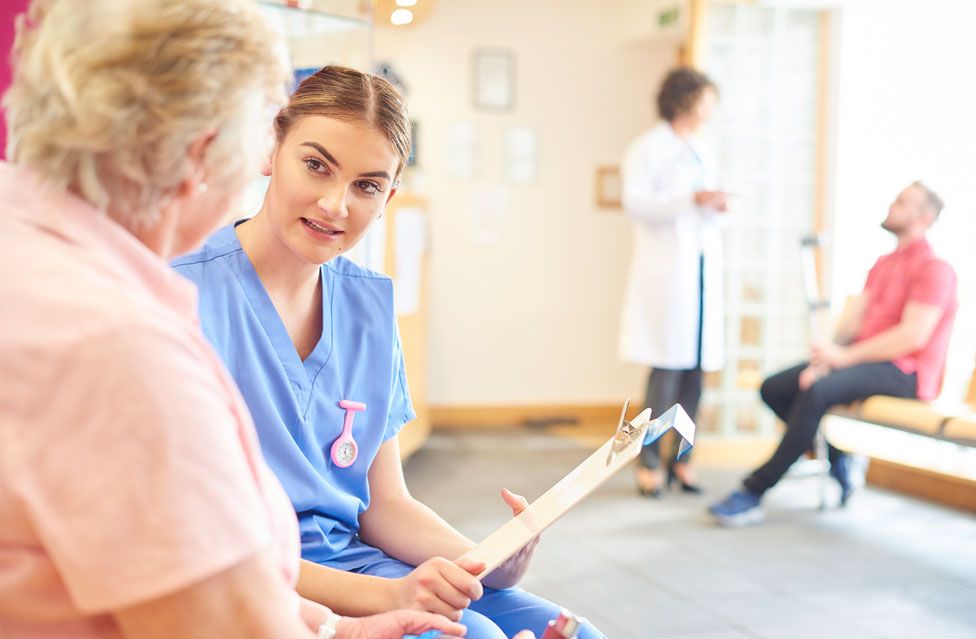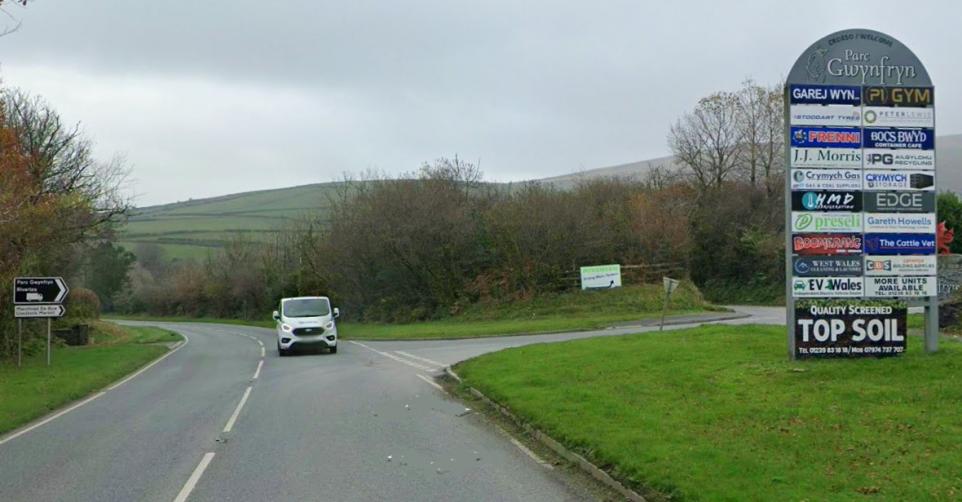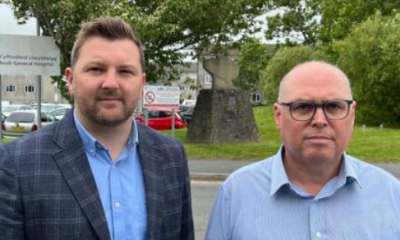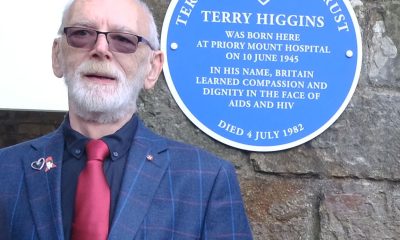Health
Ground breaking telehealth trial supports people with long term conditions in West Wales

A GROUND breaking telehealth trial has been deployed across West Wales to support people living at home with long term health conditions. One third of adults in Wales, around 800,000 people, have a long term health condition.
Hywel Dda Local Health Board is working in partnership with Delta Wellbeing, global health and care technology solutions provider Tunstall Healthcare and local primary care services support patients across Carmarthenshire, Ceredigion and Pembrokeshire living with long term conditions, such as cardiac, lung and chronic disease, at home using pioneering telehealth equipment.
The initiative focuses on supporting wellbeing in the community using remote monitoring and is transforming the way that care services are delivered to people living with long term conditions. From a service perspective, telehealth means that patients can remain in their own homes, with the reduced need to travel to appointments, and decreasing the need for staff to see patients who can be supported remotely. This in turn reduces stress and expense, and improves the quality of life for patients and their families.
Commenting on the telehealth trial, Gavin Bashar, managing director at Tunstall Healthcare, said: “Long term health conditions account for approximately 50% of all GP appointments, and more than 70% of all inpatient bed days. Using telehealth can help to provide ongoing monitoring to these patients in their own homes, enabling early intervention and empowering them to feel more confident in managing their health.
“Patients in the trial use using telehealth equipment including a blood pressure cuff, weighing scales and a pulse oximeter. The readings from these devices are transmitted to the Tunstall myMobile app on their smartphone and all the information submitted by the patient can be viewed remotely by clinicians 24/7, allowing preventative action to be taken.
“The telehealth service means that changes to a patient’s health or any response to medication can be monitored in real time, ensuring help can be provided at the earliest opportunity. This can lead to a reduction in the need for more complex interventions. The service has protected the wellbeing of vulnerable patients, improved outcomes in patients living with long term conditions, enabled the faster discharge of patients from hospital and provided personalised monitoring of complex comorbidities.”
Clinicians use software that provides a dashboard which prioritises patients that are most in need of care, and allows specialist nurses and primary care to remotely monitor each patient’s symptoms and progress. Areas of concern will generate an email or text message to clinicians, enabling them to be addressed promptly. The technology also allows patients to have consultations by video helping to avoid unnecessary visits to clinics or hospitals. When required, face to face appointments will be arranged for further treatment and consultation.
So far around 300 patients have been supported through the service. Early assessment of patient reported outcome measures show improvement of quality of life and a change in behaviour with improved physical and psychological outcomes.
Speaking on the benefits of home monitoring, 79-year-old cardiac patient Pat , said: “My heart nurse asked me if I would try this new technology that they were bringing in. I’ve had absolutely no problems what-so-ever. It’s no more difficult than going into a GP surgery. It’s all connected to the iPad I have been given which then goes straight through to the heart clinic. It’s so easy! You can do everything from your own armchair no problem at all.”
Clare Marshall, heart failure specialist nurse for Hywel Dda Local Health Board, added: “Telehealth equipment allows me to manage medication changes from a distance, which patients really like. I have been able to prevent hospital admission and more complex care interventions for a patient whose heart rate had decreased following a change of medication.
“Overall, the service empowers patients to manage their own condition as they learn more about what impacts upon their health, and increases confidence in recognising their symptoms. The service builds upon the principles of shared decision making and co-production in healthcare, delivering improved outcomes.”
The trial follows Delta Wellbeing’s successful CONNECT proactive technology enabled care (TEC) programme which has been acknowledged as an exemplar in the UK, providing a good practice example of working across sectoral boundaries to deliver a radical, person-centred approach to wellbeing, care and support.
CONNECT focussed on supporting prevention and wellbeing through a technological and digital approach, and combining bespoke technology enabled care equipment with wellbeing calls, access to a 24/7 community response and digital support. Delta CONNECT is a pioneering national programme funded under the Welsh Government’s Transformation Fund through the West Wales Care Partnership Board.
Health
Accidental poisoning deaths surge in Wales as elderly face growing risk

Nearly 200% rise in five years raises alarm among safety experts
ACCIDENTAL poisoning deaths in Wales have surged dramatically, with new safety data showing a sharp increase in fatalities and a growing risk to older people living at home.
Figures released by the Royal Society for the Prevention of Accidents (RoSPA) show 252 people in Wales died from accidental poisoning in 2024, compared with 85 deaths in 2019 – an increase of almost 200 per cent in just five years.
Safety experts say older people are particularly vulnerable. Those aged 65 and over are more than five times more likely to die from an accidental poisoning – excluding narcotics – than the general population.
Even when alcohol-related incidents are excluded, people in this age group remain more than four times as likely to die from accidental poisoning.
Across the UK the trend is also rising sharply. Official figures show 5,770 people died from accidental poisonings in 2024, a 63 per cent increase over the past decade.
Hospitals in England recorded 17,252 admissions linked to non-narcotic poisoning last year, including nearly 5,000 cases involving older adults, who were 55 per cent more likely to require emergency hospital care.
RoSPA warns that people living with dementia face particular dangers inside their own homes because the condition can affect memory, recognition and perception. Everyday household products such as cleaning sprays, laundry detergents and medicines can easily be mistaken for food or drink.
Rebecca Guy, Senior Policy Manager at RoSPA, said: “Families caring for vulnerable relatives can experience genuinely frightening moments. Turning away for just a few seconds and realising someone has swallowed a cleaning product is sadly something some people have experienced.
“These incidents are not freak accidents. They are predictable and preventable events, and our new guidance is designed to help people take simple steps to make their homes safer.”
The charity has released new home-safety guidance aimed at helping families reduce risks, including practical advice on safely storing medicines and household chemicals.
Paul Edwards, Chief Nursing Officer at Dementia UK, said brightly coloured packaging on cleaning products can create confusion for people living with dementia.
“Laundry and cleaning products are often easily accessible in our homes, and many have brightly coloured packaging which can cause confusion for people with dementia, who may mistake them for edible items,” he said.
“One of the challenges of supporting someone with dementia is balancing an individual’s independence with their safety. It is impossible to eliminate risk completely, but these guidelines offer simple steps people can take to reduce the chance of these accidents happening.”
Simon Wheeler, Senior Knowledge Officer at Alzheimer’s Society, said staying safe at home is a key concern for families affected by dementia.
“As dementia progresses, people may find it harder to tell the difference between something that’s safe to eat and something that isn’t,” he said.
“Storing cleaning products safely and out of sight can help reduce the risk of accidents.”
RoSPA is urging households to take simple precautions, including locking away cleaning products, keeping medicines securely stored, and ensuring hazardous substances remain in their original packaging.
Safety experts warn that without greater awareness, accidental poisonings could continue to rise as the population ages and more people live independently at home.
Business
Crymych golf simulator, play space and wellness centre call

A CALL for approval for the use of Crymych industrial units as a golf simulator, child’s play space and a wellness centre offering a sauna, ice baths, and oxygen therapy has been submitted to county planners.
In an application to Pembrokeshire County Council, Mr and Mrs Evans, through agent Preseli Planning Ltd, seek a partly retrospective permission for the erection of commercial building containing three individual business units, at a former vacant storage yard at Parc Gwynfryn, Crymych.
A supporting statement says: “The building provides three sperate business spaces, two of the units are occupied, one as a golf simulator (7B 2) a second is occupied by a child’s role play and play space (7B 4) and the central unit (7B 3) is currently unoccupied, proposed to be let as a wellness centre.”
The site owners and applicants, Mr and Mrs Evans, are also the operators of the golf simulator enterprise and the original developers of the industrial estate, the statement says.
“The aim of the application is to regularise the existing building and existing and proposed uses. The building was substantially complete May 2025 and first occupied June 2025. Unit 7B2 is occupied by a golf simulator whereby users book slots online and self-serve.
“Unit 7B3 is currently unoccupied but would be occupied by wellness centre once planning permission is granted, consisting of sauna, ice baths, cryotherapy room, oxygen therapy etc. Unit 7B4 is occupied by a new enterprise which offers indoor roleplay space for children, Byd Bach.”
It adds: “In terms of the golf simulator, this is owner managed and the sites proximity to their main office within the site makes managing and attending the unit convenient and enables multiple businesses to be managed by the same members of staff.
“In terms of Byd Bach, this is operated by a local couple who also manage other premises in Crymych, amongst other employment. The site’s proximity to Crymych is therefore important and these arrangements are only successful given that the site is well-related to Crymych.
“The offering would not disrupt existing comparable provision, the closest facility of this kind being in St Clears, well beyond the catchment of this facility.
“The third unit is not yet occupied but would be operated by a local spinal injury sufferer, and athlete, who would benefit from the facilities themselves and offer therapy for others.”
Citing a recently-approved change on use of a building on the industrial site itself to a Hair and Beauty Salon, it said it was considered the development would not have a significant detrimental effect on the overall supply of business units or land in Pembrokeshire or Crymych.
The application will be considered by county planners at a later date.
Community
Emergency call to protect Withybush Hospital by local councillors

AN EMERGENCY call for Pembrokeshire’s council to take greater action in safeguarding the future of Withybush hospital is to be heard next week.
At the full council meeting of March 5, an emergency notice of motion by the council’s 11-strong Conservative Party group will demand that the Welsh Government immediately reverses the decision to cease emergency general surgery at Withybush Hospital.
Last year, Hywel Dda University Health Board consulted with its communities on options for change in critical care, dermatology, emergency general surgery, endoscopy, ophthalmology, orthopaedics, stroke, radiology and urology.
It said its Clinical Services Plan focuses on nine healthcare services that are “fragile and in need of change”.
The proposed changes included an option for Withybush patients needing specialist critical care being transferred to Glangwili.
At a recent two-day meeting, the board, amongst its many other decisions, backed changes into emergency general surgery which will see no emergency general surgery operations taking place at Withybush, but a strengthening of the same-day emergency care (SDEC).
A petition against the plans already has more than 4,000 signatures and has met an angry response from local politicians and campaigners.
At the March council meeting, the Conservative council group, led by Cllr Di Clements, will say: “The Welsh Government has powers of intervention in Sections 26-28 of the NHS (Wales Act) 2006 which enables it to intervene in decisions made by a health board, in this case the Hywel Dda University Health Board.”
It says that Pembrokeshire residents “have seen continual downgrading of services over the years, and this has been detrimental to all residents,” adding: “We believe this recent decision is life threatening to those who need emergency surgery and a matter of resident’s safety.
“Every hour lost, on average, survival rates decrease by four per cent. Those who live furthest west and north will be affected the most.”
The group adds: “We are concerned especially that this has the huge potential to affect A&E provision. With limited opportunity for doctors to operate we are concerned that our county hospital will be left with few or no senior surgeons and A&E will be forced to close.”
The group has also questioned the accuracy of figures quoted by the First Minister Eluned Morgan on the number of affected patients, saying: “HDUHB own figures for the changes to emergency surgery put the number at nine per week, not five.”
The group has said it “acknowledges that Pembrokeshire County Council has no control over health services in the county, but the 60 county councillors represent approximately 120,000 people who at some point may need hospital services”.
Group leader Cllr Di Clements said: “I am certain the whole county will support our aim to prevent any more downgrading of services at Withybush.
“We are treated like second class citizens, and it is just not good enough.”
-

 Health7 days ago
Health7 days agoPetition calling for Withybush intervention nears 5,000 signatures
-

 News7 days ago
News7 days agoWelsh Government criticised after Russian-linked drone image used in defence announcement
-

 News6 days ago
News6 days agoHoax 999 call sparks massive lifeboat and helicopter rescue — man arrested
-

 Community7 days ago
Community7 days agoPub reopens with VIP club launch and free drink offer
-

 Charity6 days ago
Charity6 days agoBig Bash brings community together to support grieving children
-

 Health6 days ago
Health6 days agoPetition against hospital service changes surges past 6,000 signatures
-

 Crime6 days ago
Crime6 days agoSt Dogmaels man jailed over hundreds of indecent images
-

 Crime6 days ago
Crime6 days agoWest Wales man jailed for murder of five-month-old baby





























